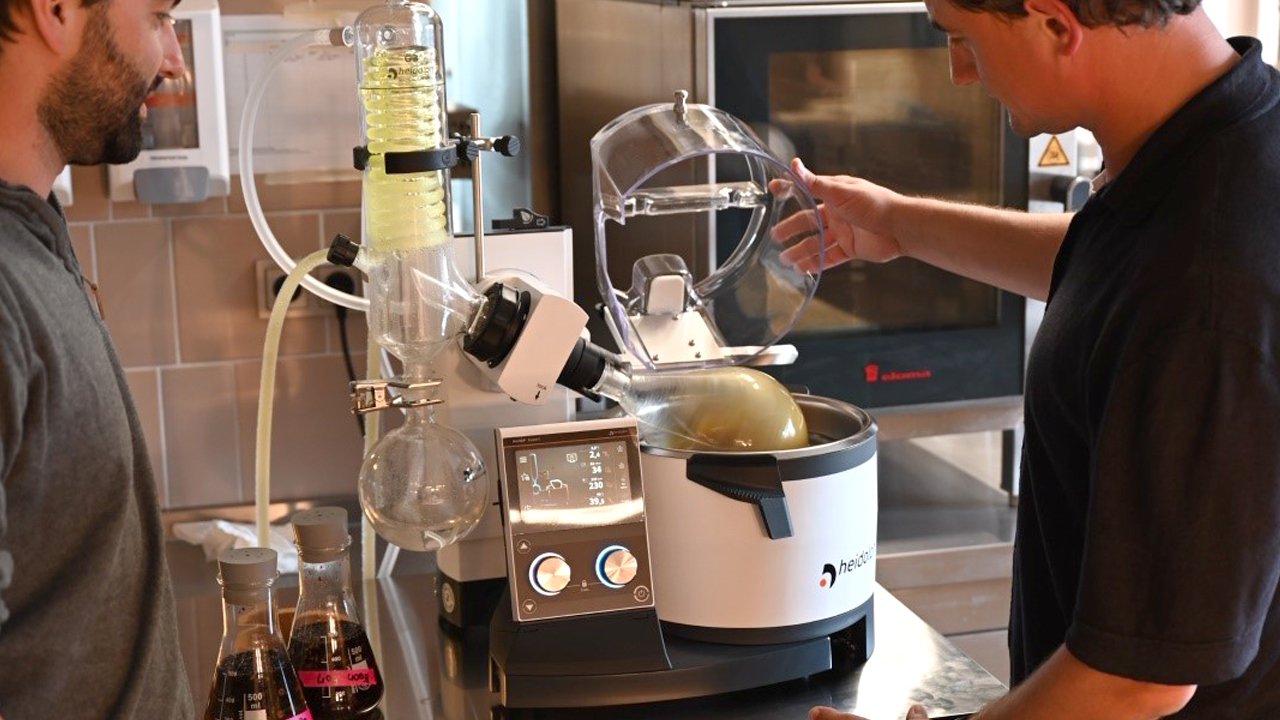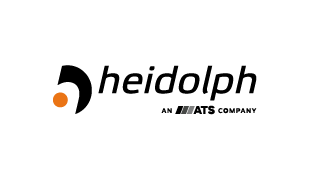Case Study
Heidolph rotary evaporators get the best out of nature
October 2022

- Hei-VAP
- Extraction
- Industrie agroalimentaire
Since it was founded in 1969, Destilla GmbH based in Nördlingen, Germany, has supplied natural flavors & compositions and essences to the manufacturers of drinks, dairy products, specialty foods and confectionery. Thanks to its in-house analytics and top standards, the customers can rely on the purity of the natural starting materials and the uniform manufacturing quality. The extracts are concentrated in the laboratory in a vacuum in two LABOROTA 20 control automatic large rotary evaporators* made by Heidolph, providing the basis for the scale-up to production. Destilla managing director Matthias Thienel and Peter Vogel, head of the development department for natural raw materials, revealed to us how the Heidolph devices are used in the laboratory.
Sustainability is part of the Destilla DNA
“My personal goal is to offer our customers and consumers the best, most natural taste experience possible.”
(Matthias Thienel, Managing Director, Destilla GmbH)
For the young company boss, the third generation to run Destilla, sustainability begins with the active conservation of nature and leads via the choice of raw materials as parts of the food cycle through to careful processing of the ingredients. “Sustainability is part of our DNA”, explained Thienel, “this is why we start with ourselves and do all that we can to make sure that our beautiful homeland remains a place worth living in for our employees and their families. The next goal is to make the entire production energy-independent and to reuse all side streams.”
Whether fresh herbs from the region, fruit from Latin America or spices such as cinnamon, cardamom, pepper and saffron from Asia – only the best, natural raw materials from sustainable cultivation are further processed in the Destilla works in Nördlingen to produce plant extracts and distillates for the manufacture and refinement of gherkins, gummy bears, bonbons, spirits, mulled wine, liqueurs, cookies or lemonade. The quality is not only revealed when tasting the finished products. On entering Destilla’s raw materials warehouse, the olfactory nerves are subjected to a sensory frontal attack.
Natural diversity challenges product development
“We extract herbs, spices, fresh fruit, fruit, vegetables, mushrooms, nuts and wood. Anything that contains valuable constituents and taste and is approved as a raw material in the aroma industry”, explained Peter Vogel. This diversity also contains the greatest challenge for the aroma wizards in Nördlingen.
Vogel continued: “Each raw material behaves differently. For example, products containing starch and pectin must always be subjected to enzymatic degradation. Otherwise you tend to obtain a jelly rather than an extract that can be used industrially. During the evaporation, we measure the degree of concentration via the Brix value or refractive index. This is known in the wine and fruit juice industry and can be determined within a few seconds by optical measurement.“
Short excursus on the Brix value
Degrees Brix is a unit of measurement of the relative density of liquids and indicates their sugar content. 1 degree Brix equals 1 percent sugar. One method of measuring the Brix number is to optically determine the refractive index with a refractometer. The refractive index describes how fast and at what angle a light beam penetrates a solution.
“In general, we need between 60 and 80 degrees Brix to produce a stable and non-perishable extract. The extract becomes increasingly viscous with increasing concentration and it is sometimes a real challenge to remove it from the extraction flask”, continued Vogel.
Apart from the Brix value, a large number of other measurements are taken in the laboratory to determine the quality. In order to standardize the products, among other things, the Destilla laboratory determines the pH value, density, alcohol content and the content of specific constituents such as caffeine in coffee extracts or vanillin in vanilla extracts.
Gentle extract concentration in the Heidolph rotary evaporator
At the beginning of each aroma composition, small-scale tests are performed with quantities from 100 g to 1 kg. Larger quantities of extract are produced with the large rotary evaporator and serve as a scale for the design of the production processes.
The raw material is extracted beforehand in an upstream process. The solvents used are water and ethanol in all kinds of different ratios, depending on the constituents and the required sensor technology. The solvent is removed again in the rotary evaporator and the extract is concentrated. “Here we work in a vacuum to avoid impacting the product thermally and to enable energy-efficient evaporation”, explained Vogel.
“Heidolph is known to anyone who works with rotary evaporators. An additional positive aspect in the cooperation is our regional proximity. We know that we will be helped in the fastest way possible in the event of any problems.”
(Peter Vogel, head of development, Destilla GmbH)
Vogel has been convinced of the quality of Heidolph rotary evaporators for many years. In his eyes, the main advantage lies in the precise control of the temperature and the vacuum during evaporation. The fast and easy cleaning of the system parts is also a positive aspect. Alternative laboratory evaporators are usually very complex by comparison and would be too time-consuming and complicated to handle for daily use. Especially if something goes wrong, you have to be able to respond quickly.
The head of development gives away some in-house details: “Surprises and failed tests occur time and again during development work. If the wrong solvent compositions or temperatures are chosen, it occasionally happens that the extract is very viscous or even becomes hard so that it is very difficult to get it back out of the flask. Many natural substances also contain saponins as an antibody against fungal infestation. They are known for their strong foaming behavior and it can easily happen that you have a complete chiller full of foam. But all of these problems can be corrected by making changes in the extraction process or by controlling the vacuum and the temperature.” Thienel added: “With the VV2000, we use an old Heidolph rotary evaporator from 1997, but it still works faultlessly. We are therefore fully familiar with the excellent quality and durability of the devices.”
The Essence of Nature: the claim says it all
Destilla only uses natural raw materials and no synthetic starting materials – and did so long before they came under fire in public. Matthias Thienel’s grandfather, the founder of the company, Franz Latka, took the far-reaching and visionary decision long ago. The company in Nördlingen passes on this invaluable, decades-long experience in innovative workshops, like the one recently held with Heidolph Instruments in the Post Hotel in Wirsberg.
The use of the rotary evaporator in kitchens was presented together with the 2-star kitchen team of the “Restaurant Alexander Herrmann” by Tobias Bätz. The focus was on waste recycling in combination with the production of extracts. Vogel explains: “Very large quantities of bread are left over in the kitchen. We processed these to produce a roasted bread extract by roasting and alcohol-based extraction. The result was astonishing and had flavors of coffee and roasted chicory. The cooks’ task is now to use this product as a taste component in a menu. As a tip for beginners, I can only recommend that they examine the constituents of the individual products. This protects against surprises when evaporating and also in the concentration process.”
After the interview, Matthias Thienel and Peter Vogel sent us on our journey home with plenty of praise: “We can only praise the Heidolph company and its support team. If we have any questions or problems we are always helped simply and quickly”.
Thank you, dear Destilla team, for the kind words, trust and cooperation for this user report!
Did you know? We have set up a blog specially for aroma management with the rotary evaporator at flavor.heidolph.com! Apart from tips & tricks, many inspiring recipes and ideas from the award-winning kitchen and bar await you there.
*The current equivalent variant for this is the Hei-VAP³ Pro Industrial package

